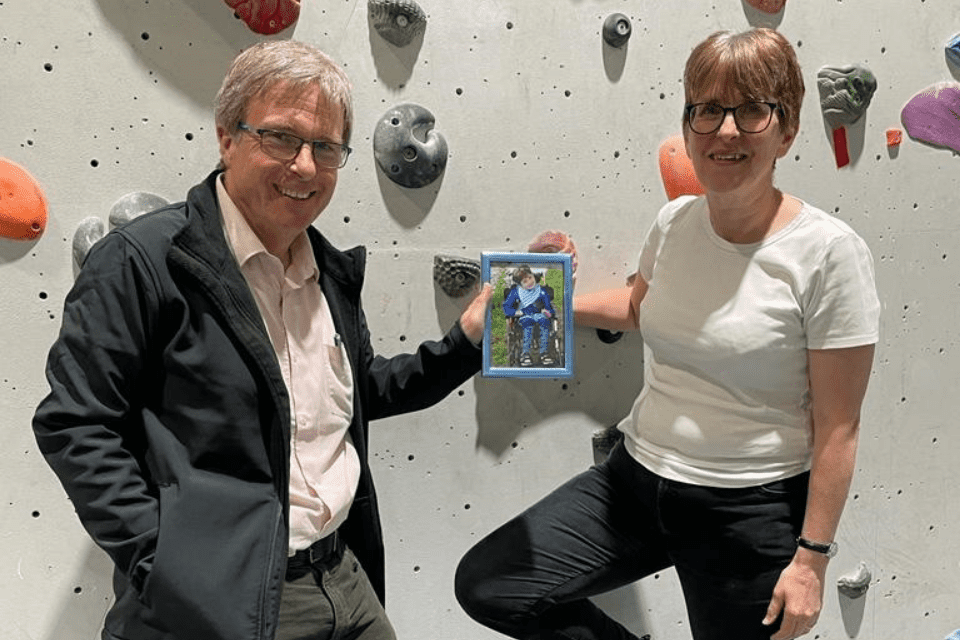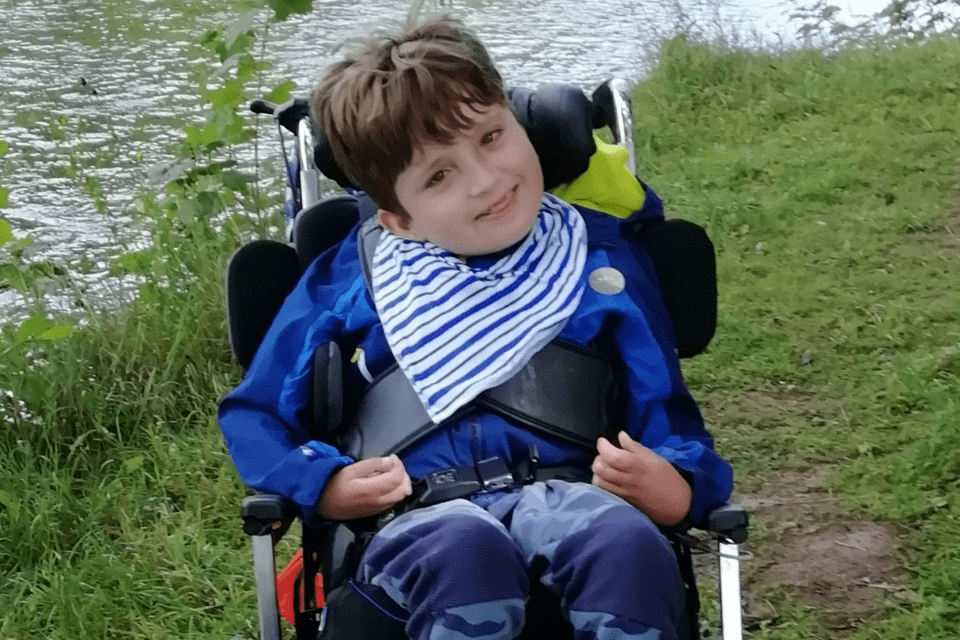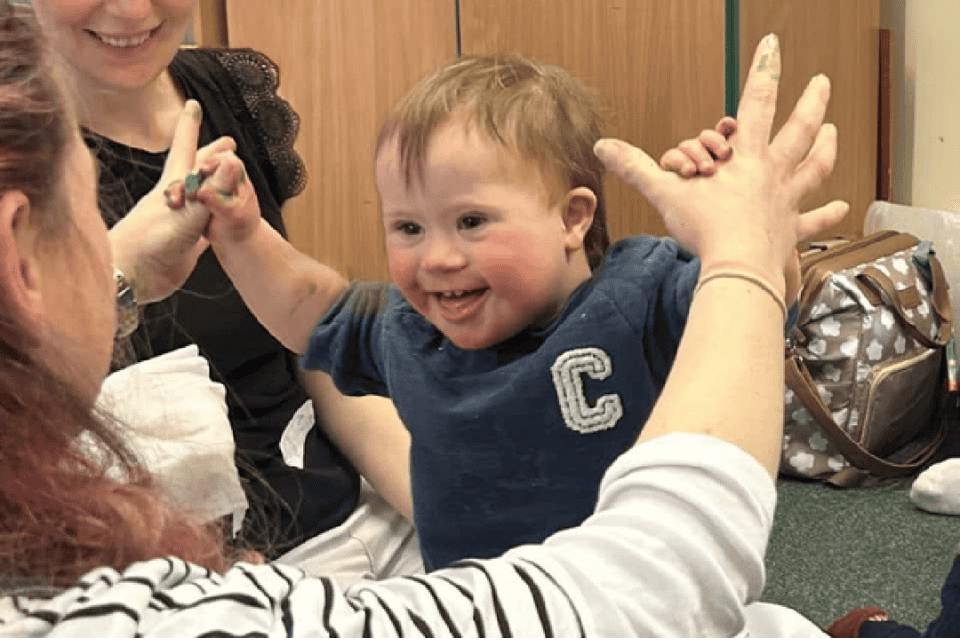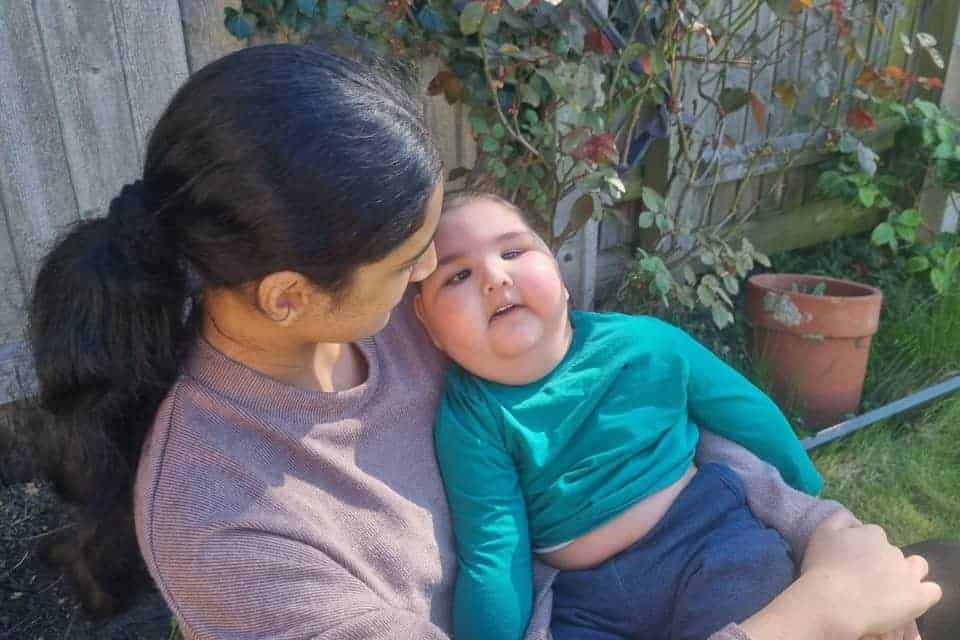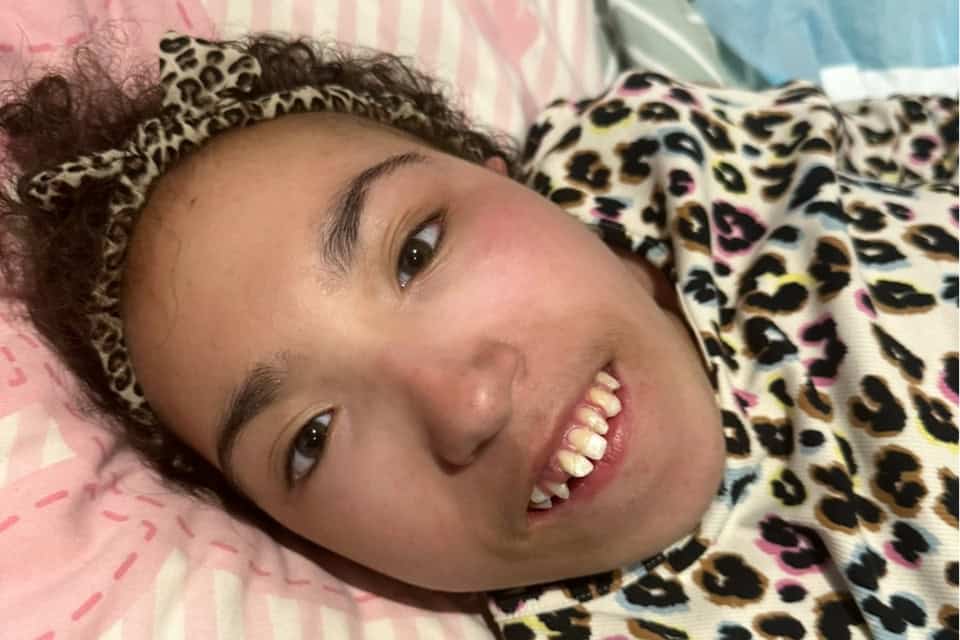Est. read time: 6-7 minutes.
Samuel Revitt, or Sam, was a young boy who received care at The Treehouse. He loved being with people, enjoyed school, being with his church family and joining in as a cub scout. Sadly, Sam died at the hospice early in 2022. His family have kindly shared some of their story and told us about Sam, his impact on their lives and how The Treehouse’s support formed such a valuable part of their lives.
Sam lit up rooms with his “big smile and cheeky giggle.” As mum Penny recalls: “he was a very happy, contended little boy, and people were always pleased and excited to see him. He was very much one to seize the moment and live for the day. Although he was non-verbal, Sam had his own way of communicating and preferred doing that to taking part in activities.”
Sam was very people-orientated and enjoyed being around others, be it children, care assistants or nurses. For example, he would much rather go in the sensory room with others than on his own. Then it became an exciting space to explore with someone else. He always wanted to interact with people and loved being part of his school and the family’s church community. That’s what people will remember him for, and he’s left a big hole in the lives of everyone who knew and loved him.
Sam also enjoyed being a Beaver and Scout in the Rainbow section of the 10th Ipswich Scout group, a section for children with physical disabilities and learning difficulties.
Sam’s epilepsy affected his whole life, but it was only six months before he died that his diagnosis of Dravet Syndrome was confirmed, and understood by Penny and husband Andrew. Dravet Syndrome (DS) is defined as a severe form of epilepsy that can be characterised by frequent, prolonged seizures, often triggered by high body temperature (hyperthermia), developmental delay, speech impairment, ataxia, hypotonia, sleep disturbances and other health problems. In most children, it is caused by a genetic mutation in the SCN1A gene. Defects in this gene cause improper functioning of brain cells, which plays a role in the development of epilepsy.
Prior to his final diagnosis, Sam, Penny and Andrew, who live in Ipswich, lived in “blissful ignorance.” Penny said: “We carried on but there were key moments along the way, as I’m sure is the case for other parents in similar situations. This included having to get used to different types of equipment, medication, surgery and then, of course, Sam’s diagnosis. These things take some adjusting to and trip you up, because they can mean big changes. Sam’s condition led to issues with things like his muscle development and his spine was curved. It was very gradual, though, and we got on with our lives. Sam was three and a half when we were told he needed to use a wheelchair. He went to a normal nursery and then joined Thomas Wolsey School, in Ipswich. As a family, we enjoyed our life together but tended to avoid big, busy places, unless there was lots of space to find a quiet area. Or we’d get up and go early in the morning.”
Mum Penny looks back with pride at the way her son coped with his complex health issues and says he approached life with sheer joy and positivity. “He had his own way of explaining himself but there was a limit,” she said. “He didn’t like it if there were too many people. If it was too loud and noisy, he would feel overwhelmed and overloaded.”
In the latter part of his life, Sam and his family started spending time at The Treehouse. He enjoyed regular day care, which he loved – and this provided a welcome break for Penny and Andrew.
“Sam was happy to be left at the hospice,” said Penny. “It also gave staff an excuse to get the paint and glue out! It gave us a valuable break from daily life and having to worry about things like syringes, feeds and medication – things we had to think about several times a day, every day. It meant we could do things like going for a walk on uneven or steep paths, or have a romantic meal together – something outside of our everyday routine. EACH have a tough job. They are there to help children, young people, and their families through challenging and difficult times. Each family is unique and needs varying levels of support. Family circumstances are often changing. In our relationship with EACH, we have felt supported every step of the way. The staff have always been respectful and compassionate. We are happy to champion EACH.”
There is no better example of that support than when it came to the end of Sam’s life. Sam and his parents had spent time at the hospice receiving respite care, attending family events and support groups, and enjoying music therapy. Through these visits the family had built relationships which made everything more comfortable when Sam came to end-of-life care.
Penny said: “We were familiar with the building and more importantly the people, which made such a difference. The foundations had been laid, which made things more relaxed. The environment was familiar, and the staff pulled out all the stops, putting so much thought into the little things like having a home-made name plaque on the bedroom door, Sam’s name written on the wipe board with a heart shape next to it and books with his name on by the bed.”
Andrew added: “Having spent some weeks in a hospital environment, bringing Sam into the hospice almost felt like coming home – we were able to relax and be ourselves at last. We felt protected and shielded. We could invite the people we wanted to be with us, rather than people turning up at our house.”
All the way to the end of his life, Sam was comfortable and well looked after. “Andrew and I felt reassured,” said Penny. “Our privacy was respected, and we knew we could have private time if we needed and wanted it. Equally, we always knew we weren’t alone. Support was there as and when we needed it. The care team are more than just nurses and medical professionals. The support and care we received was very compassionate and respectful. We had choices and were always involved in the decision-making process. They have so many skills and honestly couldn’t have done more for us or Sam.”
Penny says her and Andrew will always be grateful for EACH’s support. She said: “Sam was with us for just ten years. He was the light of our lives and won many hearts over with his smile, his giggle, and his big personality. Joy had a way of splurging out of Sam, despite his limitations. He took everything in his stride. We are grateful to EACH for helping us navigate life with Sam and very grateful for their compassionate care to enhance his and our lives, and to make sure he left this life in a peaceful way surrounded by love.”
